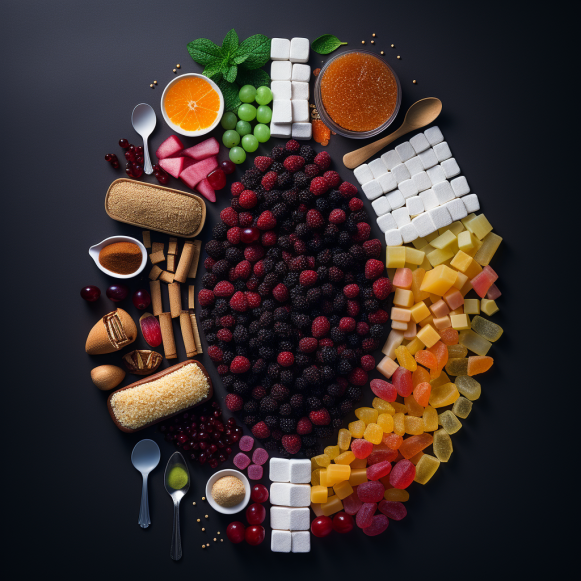Mayo Clinic Q&A: Is erythritol a safe and healthy sugar substitute?

Erythritol is found in extremely low levels in various fruits.
TO THE MAYO CLINIC: A friend’s family has a history of diabetes and obesity. She is committed to eating healthily and enjoys sharing new recipes and food information. She recently mentioned erythritol, a sugar substitute. This product is unfamiliar to me. Can you explain what it is and whether it is safe?
ANSWER: Sugar is one of those ingredients that seems to be in the news all the time.
Excessive sugar consumption can be harmful to one’s health. Sugar found naturally in foods, such as whole fruits, is not linked to an increase in health problems. However, added sugar has been linked to a variety of chronic diseases including heart disease, obesity, fatty liver disease, and Type 2 diabetes.
Sugar comes in a variety of forms. Most people are familiar with sucrose, the white granulated sugar commonly found in kitchens, as well as raw sugar, also known as turbinado sugar, which is crystalized and light brown. Sugar substitutes include high-fructose corn syrup and other sweeteners, which are frequently used in beverages and baked goods.
Because of the known health risks associated with added sugars, the food industry has created a plethora of sugar substitutes in order to satisfy our collective sweet tooth while minimizing the negative effects of sugar.
Saccharin was the first sugar substitute that was commercially available. Saccharin has fallen out of favor over the years after it was discovered to negatively affect the good bacteria in our small intestines and gut, putting people at risk for Type 2 diabetes and obesity. However, dozens of sugar substitutes have been developed.
One promising class of sugar substitutes is the “sugar alcohols,” of which erythritol is a member. Sugar alcohols are sweet, but they aren’t sugar or alcohol. Sugar alcohols are derived from sugar and are typically produced by hydrogenating or fermenting sugar. Xylitol, sorbitol, and mannitol are examples of sugar alcohols. These are frequently found in processed foods such as gum or candy.
Erythritol is produced naturally during the fermentation of fructose (fruit sugar) and can be found in extremely low levels in a variety of fruits such as melon, pears, and grapes, as well as fermented foods such as dairy cheese and soy sauce. Our red blood cells produce very little erythritol on their own.
Erythritol is used as a food additive at concentrations that are at least 1,000 times higher than the natural levels found in food or our bodies.
While your friend may believe that avoiding added sugar will reduce her risk of chronic illness, it is important to note that sugar substitutes are not without risk. Some troubling research on the possible negative health effects of erythritol has been published in recent decades.
According to a 2001 American study, people who used erythritol as a sweetener had a three-year increased risk of major adverse cardiac events, which were defined as a non-fatal heart attack or stroke. While this was an incidental finding, meaning that the erythritol did not cause or contribute to their cardiac issues, it highlighted the need for more research to determine whether using a sugar substitute predisposes a person to a higher risk of heart attack or stroke.
A 2021 study looked at people who drank erythritol or xylitol, a similar sugar alcohol. The researchers discovered that consuming erythritol as a sugar substitute increased blood levels and increased the stickiness of the volunteers’ platelets. If we cut ourselves, platelets help the blood clot, but if they become sticky, the risk of blood clots in the body increases, increasing our risk of heart attack, stroke, or other vascular issues.
While the findings do not conclusively prove that erythritol directly increases the risk of cardiovascular disease, they do suggest that it may be best to avoid it until more evidence suggests that it is or is not safe.
Rather than searching for the perfect sugar substitute, we should reduce added sugars in our diet and reprogram our sweet tooth through other means.
If you’re craving something sweet, try a piece of whole fruit like an apple, pear, peach, or plum. Fruit is a far better investment than foods containing added sugar or sugar substitutes. Furthermore, studies show that a whole-food, plant-based diet helps to prevent chronic diseases.
There are no short cuts to eating healthy. Adults should limit their daily sugar intake to 24 grams (six teaspoons) for women and 36 grams (nine teaspoons) for men, according to the American Heart Association. Make an appointment with a nutritionist or dietitian if you feel you need more guidance or want more information about how to make positive changes in your diet. — Jennifer Drost, P.A., and Dawn Mussallem, D.O., Integrative Medicine and Health, Lifestyle Medicine, Mayo Clinic, Phoenix, AZ, and Jacksonville, FL.






